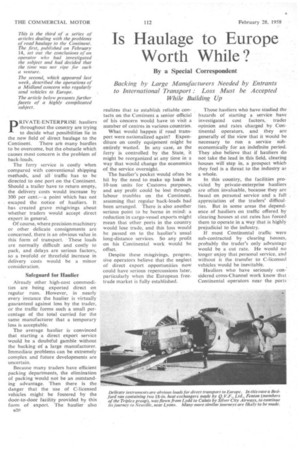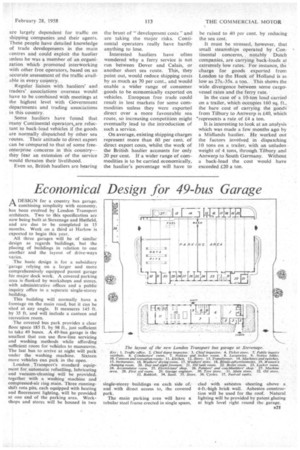Is Haulage to Europe Worth While ?
Page 54

Page 55

If you've noticed an error in this article please click here to report it so we can fix it.
By a Special Correspondent Backing by Large Manufacturers Needed by Entrants to International Transport : Loss Must be Accepted While Building Up
pRIVATE-ENTERPRISE hauliers throughout the country are trying to decide what possibilities lie in the new field of direct haulage to the Continent. There art many hurdles to be overcome, but the obstacle which causes most concern is the problem of back-loads.
The ferry service is costly when compared with conventional shipping methods, and all traffic has to be directed to one port on the Continent. Should a trailer have to return empty, the delivery costs would increase by 300 per cent.—a point which has not escaped the notice of hauliers. It has created grave misgivings about whether traders would accept direct export in general.
Of course, where precision machinery or other delicate consignments are concerned, there is an obvious value in this form of transport. • These loads are normally difficult and costly to pack, and delays are serious factors, so a twofold or threefold increase in delivery costs would be a minor consideration.
Safeguard for Haulier Already other high-cost commodities are being exported direct on regular runs. However, in nearly every instance the haulier is virtually guaranteed against loss by the trader, or the traffic forms such a small percentage of the total carried for the same manufacturer that a temporary loss is acceptable.
The average haulier is convinced that starting a direct export service would be a doubtful gamble without the backing of a large manufacturer. Immediate problems can be extremely complex and future developments are uncertain.
Because many traders have efficient packing departments, the elimination of packing would not be an outstanding advantage. Then there is the danger that the use of C-licensed vehicles might be fostered by the door-to-door facility provided by this form of export. The haulier also B20 realizes that to establish reliable contacts on the Continent a senior official of his concern would have to visit a number of centres in various countries.
What would happen if road transport were nationalized again? Expenditure on costly equipment might be entirely wasted. In any case, as the ferry is controlled by the State, it might be reorganized at any time in a way that would change the economics of the service overnight.
The haulier's pocket would often be hit by the need to make up loads in 10-ton units for Customs purposes, and any profit could be lost through labour troubles on the Continent, assuming that regular back-loads had been arranged. There is also another serious point to be borne in mind: a reduction in cargo-vessel exports might mean that other ports in the country would lose trade, and this loss would be passed on to the haulier's usual long-distance services. So any profit on his Continental work would be offset.
Despite these misgivings, progres, sive operators believe that the neglect of direct export opportunities now could have serious repercussions later, particularly when the European freetrade market is fully established. Those hauliers who have studied the hazards of starting a service have investigated cost factors, trader opinion and rates charged •by Continental operators, and they are generally of the view that it would be necessary to run a service subeconomically for an indefinite period. They also believe that if hauliers do not take the lead in this field, clearing houses will step in, a prospect which they feel is a threat to the industry as a whole.
In this country, the facilities provided by private-enterprise hauliers are often invaluable, because they are based on personal service and a full appreciation of the traders' difficulties. But in some areas the dependence of hauliers on traffic offered by clearing houses at cut rates has forced them to operate in a way that is highly prejudicial to the industry.
If most Continental traffic were sub-contracted by clearing houses, probably the trader's only advantage would be a cut rate. He would no longer enjoy that personal service, and without it the transfer to C-licensed vehicles would be inevitable.
Hauliers who have seriously considered cross-Channel work know that Continental operators near the ports are largely dependent for traffic on shipping companies and their agents. These people have detailed knowledge of trade developments in the main centres and could exploit the haulier unless he was a member of an organization which promoted interworking with other free operators, based on an accurate assessment of the traffic available in every country.
Regular liaison with hauliers' and traders' associations overseas would have to be combined with meetings at the highest level with Government departments and trading associations in this country.
Some hauliers have found that many Continental operators,are reluctant to back-load vehicles if the goods are normally dispatched by other sea routes. Their attitude to direct export can be compared to that of some freeenterprise concerns in this countrythey fear an extension of the service would threaten their livelihood.
Even so, British hauliers are hearing the brunt of "'development costs" and are taking the major risks. Continental operators really have hardly anything to lose.
Interested hauliers have often wondered why a ferry service is not run between Dover and Calais, or another short Sea route. This, they point out, would reduce shipping costs by as much as 70 per cent., and would enable a wider range of consumer goods to be economically exported on vehicles. European free trade could result in lost markets for some commodities unless they were exported direct over a more favourable sea route, so increasing competition might eventually lead to the introduction of such a service.
On average, existing shipping charges represent more than 60 per cent, of direct export costs, whilst the work of the British haulier accounts for only 20 per cent. If a wider range of commodities is to be carried economically, the haulier's percentage will have to
be raised to 40 per cent, by reducing the sea cost.
It must be stressed, however, that small steamships operated by Continental concerns, notably Dutch companies, are carrying back-loads at extremely low rates. For instance, thi charge for goods exported from London to the Hook of Holland is as low as 27s.-35s. a ton. This shows the wide divergence between some cargovessel rates and the ferry rate.
in the case of a 10-ton load carried on a trailer, which occupies 160 sq. ft., the bare cost of carrying the goods from Tilbury to Antwerp is £40, which 'represents a rate of £4 a ton.
It is interesting to look at an analysis which was made a few months ago by a Midlands haulier. He worked out the factors involved in dispatching 10 tons on a trailer, with an unladen weight of 4 tons, through. Tilbury and Antwerp to South Germany. Without a back-load the cost would have exceeded £20 a ton.




















































































































